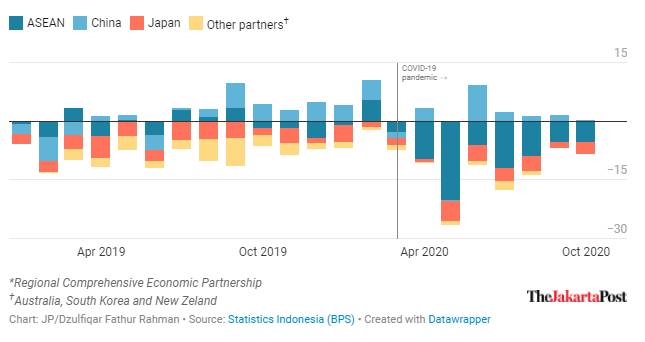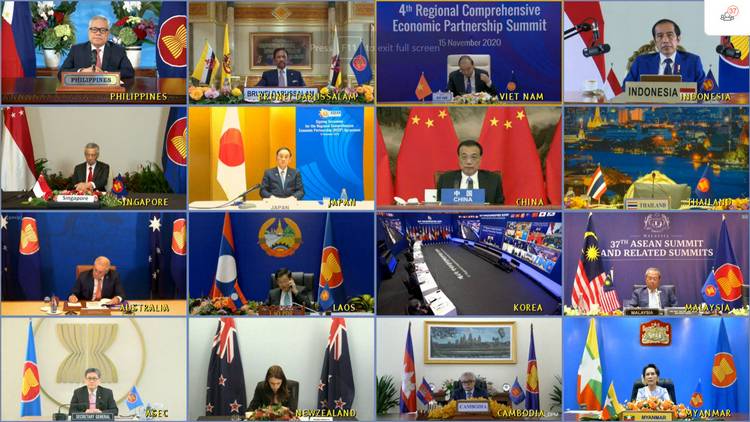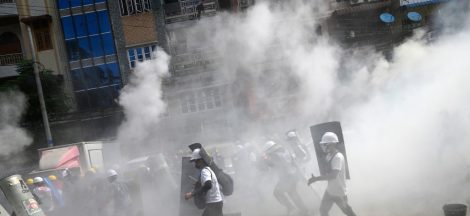Signed, sealed, delivered: RCEP concluded in turbulent year for global trade. The year 2020 marks the broadening and deepening of Indonesia’s trade relations with its key partners as they conclude the long-awaited Regional Comprehensive Economic Partnership (RCEP) amid cooling global trade due to the COVID-19 pandemic.

After around eight years of negotiations, Indonesia signed on Nov. 15 the world’s largest trade deal with the other nine ASEAN country members, Australia, China, Japan, South Korea and New Zealand. The partnership represents almost one-third of the global economy.
Turbulent Year for Global Trade
The signing took place at a time when global trade was struggling with trade frictions between China and the United States, a waning confidence in the World Trade Organization and an increasing appetite for protectionism on top of the raging pandemic.
“In this situation, it is clearly difficult for Indonesia to maximize its economic potential by boosting exports and attracting investment. We hope the RCEP can be the answer to overcoming this,” Indonesian Trade Minister Agus Suparmanto said in a virtual presser on Nov. 15.
The trade deal is important for Indonesia because the participating countries collectively accounted for 56.1 percent of Indonesia’s total exports and 94.4 percent of total imports in October, according to Statistics Indonesia (BPS).
Indonesia’s exports to RCEP countries fell 7.61 percent year-on-year (yoy) to US$8.08 billion in October while imports fell faster by 30.1 percent yoy to $7.03 billion due to the coronavirus outbreak.
Less severe declines
Contributions to annual change of Indonesia’s exports to RCEP markets, by countries (percentage points)

Coverage
The RCEP agreement, which consists of 20 chapters, covers not only trade in goods but also in services, namely telecommunications, financial and professional services. The professional services section includes the prospect of mutual recognition for professional qualifications.
Participating countries also agreed to adopt or maintain a regulation related to e-commerce, which comprises protection of users’ personal information.
The RCEP also covers a chapter on government procurement, which has not been covered by prevailing ASEAN free trade agreements (FTA) with its partners, called ASEAN Plus One FTAs, according to a summary of the agreement released by ASEAN.
Limited impact on regional trade
While the agreement adds some new areas of trade cooperation, participating countries are already trading many goods without tariffs under the ASEAN Economic Community and prevailing ASEAN Plus One FTAs, according to a report by the Economist Intelligence Unit (EIU).
China, Japan and South Korea are the only countries to join the same trade deal for the first time.
“The limited movement on tariffs means that the RCEP will provide only a modest boost for demand in Asia, with the cost of goods unlikely to shift substantially,” read the report.
“As a result, we do not expect the agreement to increase regional trade flows substantially in the coming five years.”
Leaving out ‘sensitive’ commodities
Within a 20-year period, Indonesia has committed to liberalizing 91 percent of its tariff lines and opening up 104 service subsectors under the RCEP agreement.
For services, ASEAN countries have committed to liberalizing an average of 100 to 115 subsectors and the five other partners between 100 and 138 service sub-sectors under the trade pact.
Despite the huge tariff elimination commitments, the RCEP agreement reflects the negotiators’ power to leave sensitive sectors “largely untouched”, such as the agriculture sector, according to the EIU.
The government reported that it left out, among other things, rice, weaponry and alcoholic beverages from its tariff elimination commitments under the agreement, said Iman Pambagyo, the director general for international trade cooperation at the Trade Ministry.
“These are the sectors that we always consider to be very, very sensitive for Indonesia,” Iman, who led the RCEP trade negotiating committee, said during a virtual discussion in late November. “We never include them in our commitment under any agreement.”
In Indonesia, rice has been largely mired in a tendency toward protectionist policy aimed at helping over 14 million rice farmers, the single-largest group of smallholder farmers in the agriculture sector.
The protectionist tendency is related to concerns on local farmers’ lack of competitiveness, as reflected in the gap between local rice prices that stood on average at Rp 11,800 (84 US cents) and the Thai and Vietnamese rice prices that were nearly half of that in November, according to the Indonesian Center for Information on Strategic Food Prices (PIHPS) and the World Bank’s November “Pink Sheet”.
“If we open [free trade for rice], it will harm our farmers. As we know, the disparity between prices at home and at the international level is relatively high,” agriculture professor Dwi Andreas Sentosa from IPB University told The Jakarta Post in a phone interview in late November.
Some countries, including Indonesia, are expected to ratify the RCEP next year.
The RCEP will enter into force 60 days after six ASEAN member states and three of its partners ratify the agreement and notify the ASEAN secretary-general.
The government was preparing to start the ratification process by working on the translated text of the RCEP agreement, which then would be forward to the President and the House of Representatives, Iman said in November.
The EIU expected the government to make sure that the ratification take place in 2021 as it has demonstrated a strong support for the trade pact despite its struggle with “protectionist instincts”.
“Our baseline view is, therefore, that sufficient ratification, both within and outside ASEAN, will have been secured by the third quarter of 2021, suggesting that the RCEP will probably become effective by the end of that year.”
RCEP to bring in gains for Indonesian economy
Once the agreement takes effect, the RCEP is expected to raise Indonesia’s gross domestic product (GDP) by 0.05 percent by 2032, according to an estimate from the Indonesian Fiscal Policy Agency (BKF).
Because the RCEP also covers investment, Indonesia is also expected to see some spillover of foreign direct investment (FDI) as manufacturing hubs Thailand and Vietnam have been showing overcapacity, according to Bahana Sekuritas.
“In this case, the on-the-ground implementation and regulatory execution of the omnibus law [on job creation] would be crucial in determining whether Indonesia could benefit from the post-COVID FDI waves,” read a report released on Dec. 3 by Bahana Sekuritas. [Yearender] Signed, sealed, delivered: RCEP concluded in turbulent year for global trade (Dzulfiqar Fathur Rahman, The Jakarta Post)






 Indonesian P2P Platforms Optimistic about 2021 Amid Growing Users, Disbursement
Indonesian P2P Platforms Optimistic about 2021 Amid Growing Users, Disbursement 